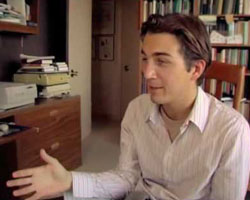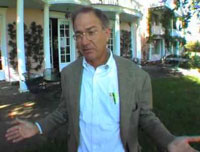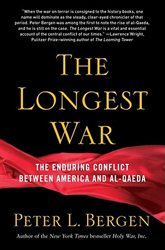 I loved this book. I’ve read a number of books about the Afghanistan and Iraq wars, and most have been very good. “The Longest War: The Enduring Conflict Between America and Al-Qaeda,” published in January 2011, represents extensive reporting of the whole history of Al Qaeda and Osama bin Laden. Bergen, a TV and print journalist, was the CNN producer who arranged bin Laden’s first interview with the Western press back 1997. He’s been working the story ever since.
I loved this book. I’ve read a number of books about the Afghanistan and Iraq wars, and most have been very good. “The Longest War: The Enduring Conflict Between America and Al-Qaeda,” published in January 2011, represents extensive reporting of the whole history of Al Qaeda and Osama bin Laden. Bergen, a TV and print journalist, was the CNN producer who arranged bin Laden’s first interview with the Western press back 1997. He’s been working the story ever since.
The book covers plenty of ground which was already familiar to me from book (Thomas Ricks, Bob Woodward, Jane Mayer, and others) and other magazine and online reporting. But Bergen illuminated other aspects of the bin Laden/Al Qaeda story which I’ve not seen addressed elsewhere.
- Bergan reports on numerous Al Qaeda plots and attacks that were new to me—probably because they didn’t involve the US, and therefore received scant coverage here. Many of these plots targeted other Arab countries, like Saudi Arabia, or Europe. Al Qaeda has been far more active than I thought.
- He describes Al Qaeda as “one of the most bureaucratic terrorist organizations in history.” This was quite fascinating. Al Qaeda was sophisticated organizationally. Their bylaws covered annual budgets, salary levels, medical benefits, furniture allowances, provisions for persons with disabilities, and even vacation policies (with requests submitted at least 2.5 months in advance). Really fascinating stuff which was totally new to me.
- Bergen showed (much to my delight) how Al Qaeda was scammed several times by persons who, knowing Al Qaeda’s interest in nuclear weapons, sold them worthless information and materials (all of which we captured in Afghanistan).
- He debunks the notion that bin Laden was on dialysis. That was never the case.
- He addresses the claim, frequently heard on Fox News, that Al Qaeda is against the American way of life. Bergen documents how from the 1990s, bin Laden has consistently maintained that his beef was with American foreign policy as it related to Islamic countries (especially positioning US troops on Saudi soil, which ended in 2003). Bin Laden himself sarcastically stated, in a tape, that if he was against the Western lifestyle, why hadn’t he attacked Sweden?
- He describes bin Laden as an effective leader tactically (pulling off a single attack), but a failure strategically. He never expected us to invade Afghanistan. At the most, he expected cruise missile attacks or air strikes. While 9/11 was a spectacular success, it backfired spectacularly in that it destroyed nearly everything he had built to that point–turning millions of Muslims worldwide against him because of the killing of civilians, bringing a greater US presence in Arab countries, enhancing the relationship between the US and many Muslim countries, losing his whole infrastructure and safe haven in Afghanistan, and causing a backlash against militant extremists in some Arab countries.
- Bergen examined every piece of “evidence” linking Al Qaeda with Iraq. None of it held water. A CIA report described the relationship between Al-Qaeda and Iraq as two rival intelligence agencies, each trying to use the other to it own advantage. There was much animosity between Saddam Hussein and Bin Laden.
- Another aspect we don’t hear about: the denunciations of bin Laden by Muslim leaders around the world, particularly in recent years. Bergen spent a lot of time on this, combing through Arab publications and media. Some former close associates and mentors of bin Laden, people with solid jihadist credentials, have publicly denounced bin Laden for targeting civilians. They have called him immoral. Very strong stuff.
- He described some agreements put into place under Bush which have helped extricate us from Iraq.
- Bergen writes that “the graveyard of empires metaphor belonged in the graveyard of clichés.” He pointed out various foreign powers that had had success in Afghanistan. He also debunked the common assumption that Afghanistan is a disjointed collection of tribes. Actually, Afghanistan has been a nation since 1747—older than the United States—and Afghanis have a strong sense of nationhood. What they DON’T have is a strong central government.
- Bin Laden, from his early days in the Sudan, was obsessed with being prepared for a life on the run. Bergen, through information gleaned from bin Laden family members and others, explains how he continually prepared his family. For instance, he wouldn’t let his kids drink cold water, or use refrigeration of any kind, because if they were forced into hiding, they would be denied such creature comforts.
- In a prophetic vein, he explains evidence from videotapes from bin Laden and Zawahiri that made it clear that they weren’t living in caves.
This is a great book which will enormously enhance your understanding of the conflicts which have engulfed the US since 9/11.


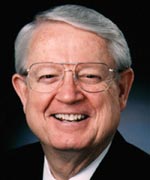 I occasionally feel bothered by our efforts, as the Christian church, to adopt the world’s ways in order to appeal to the world. There are lots of advantages to doing that, and yet, I don’t know, it sometimes just doesn’t feel right. Maybe I’m just getting old and allergic to edgy.
I occasionally feel bothered by our efforts, as the Christian church, to adopt the world’s ways in order to appeal to the world. There are lots of advantages to doing that, and yet, I don’t know, it sometimes just doesn’t feel right. Maybe I’m just getting old and allergic to edgy.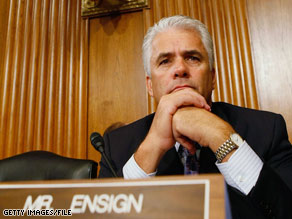
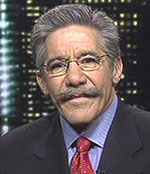
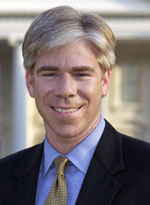
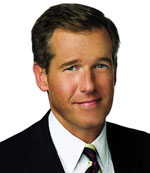
 “Rough Country” (2009) is the third book starring Virgil Flowers, a series John Sandford started in 2008. Sandford is best known for the Lucas Davenport “Prey” series (each title includes the word “prey”). He started that series in 1989, and has now pumped out 21 “Prey” books. But the Virgil Flowers books are better. Or, at least, Flowers is a much more interesting character than Davenport (for whom Flowers works, out of Minneapolis).
“Rough Country” (2009) is the third book starring Virgil Flowers, a series John Sandford started in 2008. Sandford is best known for the Lucas Davenport “Prey” series (each title includes the word “prey”). He started that series in 1989, and has now pumped out 21 “Prey” books. But the Virgil Flowers books are better. Or, at least, Flowers is a much more interesting character than Davenport (for whom Flowers works, out of Minneapolis).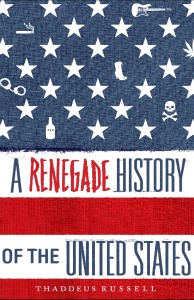 I previously reviewed the book “A Renegade History of the United States,” by Thaddeus Russell, who teaches history and American studies at Occidental College. It gives an alternative, sometimes politically-incorrect, view of our history.
I previously reviewed the book “A Renegade History of the United States,” by Thaddeus Russell, who teaches history and American studies at Occidental College. It gives an alternative, sometimes politically-incorrect, view of our history. I agree with what Donald Trump wrote:
I agree with what Donald Trump wrote:
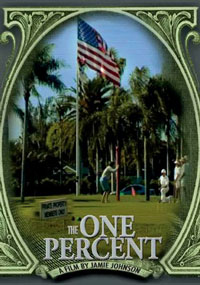 “The One Percent” is about the richest of the rich in America, the 1% of people who control over half of the country’s wealth, and who keep getting richer and richer, helped along by friendly legislators and tax codes. It’s about the gap that exists between everyday Americans and the ultra-rich.
“The One Percent” is about the richest of the rich in America, the 1% of people who control over half of the country’s wealth, and who keep getting richer and richer, helped along by friendly legislators and tax codes. It’s about the gap that exists between everyday Americans and the ultra-rich.